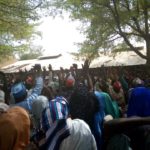The National Security Adviser to the President, Mallam Nuhu Ribadu, on Thursday, expressed concern about a booming illegal firearms market in the North.
This, he said, was a result of the high level of poverty in northern Nigeria, saying the North-West was worst hit.
According to the PUNCH, the NSA expressed the concerns while speaking at the convocation lecture of the Usmanu Danfodiyo University, Sokoto.
He delivered a paper titled, ‘Navigating the Maze: Addressing Multi-Dimensional Insecurity Challenges in Northern Nigeria.’
The illegal arms market in northern Nigeria has seen a marked increase in demand and supply.
He said, “Criminals and traffickers have developed sophisticated networks to transport illegal arms across Nigeria, deploying innovative methods to circumvent security checks.”
He, however, said President Bola Tinubu had made appreciable progress in the fight against banditry and terrorism.
Ribadu said, “Since assuming office, we have successfully freed over a thousand individuals, many of whom were villagers held captive for as long as two to three years.
“We have successfully secured the release of abducted students from the Federal University of Gusau and school children in Kuriga, among others.
“These results were achieved without paying any ransom. Our approach utilizes evidence as the foundation of our non-kinetic strategies.
On the kinetic front, the Nigerian military is conducting numerous operations targeting insurgent groups like Boko Haram and bandits operating in northern Nigeria,” he added.
Expressing concern about the rising poverty in the North, the NSA said, “According to the National Bureau of Statistics, the North-West Nigeria contains some of the poorest states in the country.
“As of 2019, each northwestern state has a higher poverty rate than the national average of 40.1 percent, with Sokoto having the highest rate in the country: 87.73 percent of the state’s population live in poverty.
“The reports also illustrate that unemployment rates in the northern regions can exceed 20 percent, a stark contrast to the more industrially diverse and economically vibrant southern regions, where unemployment rates hover around 10-15 percent.”
Ribadu, however, said the Tinubu-led administration was working hard to change the poverty narrative.










